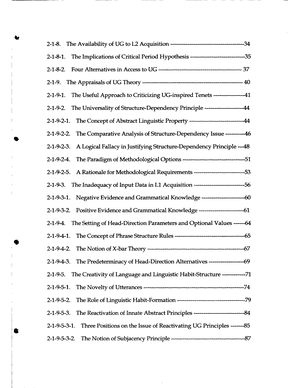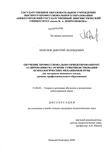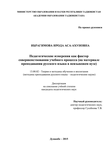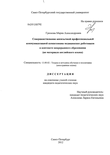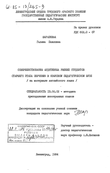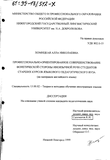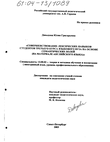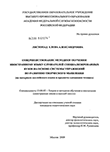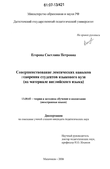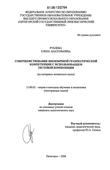Содержание к диссертации
1. Introduction
1-1. The Novelty of Dissertation 1
1-1-1. Research Purpose and Automaticity Literature 1
1-1-2. The Concept and Issues of Automaticity 2
1-1-3. The Criteria of Automaticity 4
1-2. Approaches to the Development of a Pedagogic Paradigm 5
1-2-1. An Outline of Theoretical and Pedagogical Problems 8
1-2-1-1. UG Principles and the Initial Brain State of Korean EFL Learners 9
1-2-1-2. Variability in Acquisition Process and Pedagogic Solutions =-12
1-3. The Basic Structure of the Dissertation 15
2. Theoretical Investigation 16
2-1. Korean EFL Learners Initial Brain State in English Syntax 16
2-1 -1. Objectives and Approaches 16
2-1-2. An Overview of UG Theory 19
2-1-3. Externalized and Internalized Approaches to Language 23
2-1-4. The Autonomy/Modularity of Linguistic Knowledge 25
2-1-5. The Principles and Parameters Approach 28
2-1-6. The Logical Problem of Language Acquisition 29
2-1-7. The Language Faculty and Continuity/Maturation Models 30
2-1-7-1. The Language Faculty 31
2-1-7-2. The Continuity and Maturation Hypotheses 32
2-1-7-3. The Window of Opportunity Hypothesis 2-1-8. The Availability of UG to L2 Acquisition 34
2-1-8-1. The Implications of Critical Period Hypothesis 35
2-1-8-2. Four Alternatives in Access to UG 37
2-1-9. The Appraisals of UG Theory 40
2-1-9-1. The Useful Approach to Criticizing UG-inspired Tenets 41
2-1-9-2. The Universality of Structure-Dependency Principle 44
2-1-9-2-1. The Concept of Abstract Linguistic Property 44
2-1-9-2-2. The Comparative Analysis of Structure-Dependency Issue 46
2-1-9-2-3. A Logical Fallacy in Justifying Structure-Dependency Principle —48
2-1-9-2-4. The Paradigm of Methodological Options 51
2-1-9-2-5. A Rationale for Methodological Requirements 53
2-1-9-3. The Inadequacy of Input Data in LI Acquisition 56
2-1-9-3-1. Negative Evidence and Grammatical Knowledge 60
2-1-9-3-2. Positive Evidence and Grammatical Knowledge 61
2-1-9-4. The Setting of Head-Direction Parameters and Optional Values 64
2-1-9-4-1. The Concept of Phrase Structure Rules 65
2-1-9-4-2. The Notion of X-bar Theory 67
2-1-9-4-3. The Predeterminacy of Head-Direction Alternatives 69
2-1-9-5. The Creativity of Language and Linguistic Habit-Structure 71
2-1-9-5-1. The Novelty of Utterances 74
2-1-9-5-2. The Role of Linguistic Habit-Formation 79
2-1-9-5-3. The Reactivation of Innate Abstract Principles 84
2-1-9-5-3-1. Three Positions on the Issue of Reactivating UG Principles 85
2-1-9-5-3-2. The Notion of Subjacency Principle 2-1-9-5-3-3. The Implications of Empirical Test Results 88
2-1-10. Conclusion 90
2-2. Children s Cognitive Approaches to LI Acquisition 94
2-2-1. Introduction 94
2-2-2. The Concept of Language Acquisition and Role of Syntax 96
2-2-3. The Place of Syntax in Linguistic Competence Development 98
2-2-4. The Systematic and Incremental Route of Syntactic Development 99
2-2-5. Single-Word and Early Multiword Utterances 101
2-2-5-1. Extraction and Segmentation in Initial Utterances 101
2-2-5-2. The Child s Early Approaches to Language Acquisition 102
2-2-5-3. The General Syntactic Properties of Initial Utterances 104
2-2-5-4. The Linguistic Analyses of Early Multiword Utterances 108
2-2-5-4-1. The Analysis of Semantic Notions 110
2-2-5-4-2. The Analysis of Pivot Lexicons 111
2-2-5-4-3. The Analysis of Limited Scope 112
2-2-5-4-4. The Analysis of Syntactic Notions 113
2-2-5-5. The Rules of Word Order and Syntactic Implications 116
2-3. Comparative Perspectives on English and Korean Syntactic Structures — 118
2-3-1. An Overview of English and Korean Syntactic Operations 118
2-3-2. The Features of English Syntactic Operations 122
2-3-2-1. Yes/ No Questions 124
2-3-2-2. Question-Word Questions 126
2-3-2-3. Indirect Object Movement 128
2-3-2-4. Passive 129
2-3-2-5. Extraposition 131
2-3-3. The Features of Korean Syntactic Operations 132
2-3-3-1. Question Formation 134
2-3-3-2. Passive 135
2-3-3-3. Causation 137
2-3-4. The Implications of English-Korean Syntax Comparison 138
3. Experimental Instantiation 139
3-1. Introduction 139
3-1-1. The Outlines of Three Prior Inquiries 139
3-1-2. Grammar-focused Language Pedagogy and Some Related Issues 140
3-2. The Design and Method of Experimental Study 143
3-2-1. An Overview of Subjects and Research Design 143
3-2-2. Detailed Methods and Practiced Cycles 143
3-3. The Formation and Testing of Hypotheses 146
3-3-1. Hypotheses Formation: A Pedagogic Paradigm for Automaticity 146
3-3-2. Materials Development and Hypotheses Testing 148
3-3-2-1. The Development of Materials 148
3-3-2-2. The Testing of Hypotheses 151
3-3-2-2-1. The First Hypothesis 151
3-3-2-2-2. The Second Hypothesis 153
3-4. The Results of Experimental Study 157
3-4-1. Median Completion Time in Fixed-Mode Practice Tasks 157
3-4-2. Median Syntactic Errors in Free-Mode Practice Tasks 158
4. Conclusion 159
5. Bibliography 160
6. Supplements 168
6-1. Core Syntactic Forms and Rules - Syntactic Extraction Process 168
6-1-1. Experimental Research Materials-1 168
6-1-2. Experimental Research Materials-2 171
6-2. Lexical Insertion Accessibility and Phrasal Addition Applicability Semantic Expansion Process 175
6-2-1. Experimental Research Materials-1 175
6-2-2. Experimental Research Materials-2 187
6-3. A Questionnaire for the Standardized Survey 199
7. Explanatory Notes 206
8. Raw Discourse Data for Experimental Research 2

